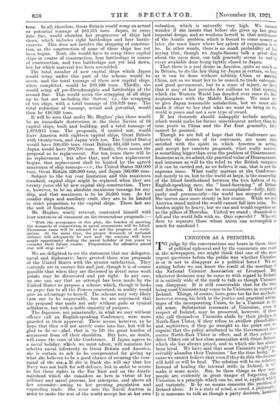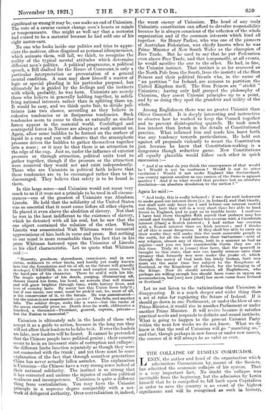UNIONISM AS A PRINCIPLE.
TO judge by the conversations one hears in these fines of political upheaval and by the comments one reads in the newspapers, one might think that one of the most urgent questions before the public was whether Unionism is or is not to disappear as a political force / We are writing before we can know the result of the meetings of the National Unionist Association at Liverpool. But whatever decisions may be come to with regard to Ireland, it is entirely wide of the mark to talk as though Unionism can disappear. It is still conceivable that for the time being most Unionists may cease to be Unionists in respect of Ireland. Things, of course, have gone too far for anybody, however strong his faith in the justice and practical advan- tages of the incorporating Union, to be a Unionist in the old sense. Substantial remnants of Unionism, even m respect of Ireland, may be preserved, however, if those who call themselves Unionists abide by their pledges to North-East Ulster, if they refuse to swallow plausibihties and sophistries, if they go straight to the point and re- cognize that the policy attributed to the Government does coerce North-East Ulster in effect, and if they refuse tc drive Ulster out of her close association with Great Britain. which she has always prized, and to which she has alway, been loyal. We have said that most Unionists might cols ceivably abandon their Unionism "for the time being,'; be- cause we cannot believe that even if they do this the decisror will hold or will be final. The solution will be no solution.. Instead of healing the internal strife in Ireland, it Wit make it more acute. But, be these things as they BWb3t
,
people are evidently in great danger of forgetting t,. Unionism is a principle which can be, and is, applied wide*, and variously. It by no means concerns the problem 0.1 Ireland alone. It is a state of mind, a creed, a philoso& • It is nonsense to talk as though a party decision,-hoivesw significant Or wrong it may be, can make air end of Unioniem. The vote of a caucus cannot change men's hearts or minds or temperaments. One might as well say that a motorist had ceased to be a motorist because he had sold- one of his eight motor-cars.
No one who looks inside our politics and tries to appre- ciate the motives, often disguised as personal idiosyncrasies, which animate them, will fail, we think, to recognize the reality of the typical mental attitudes which determine different men's politics. A political programme, a political speech, a Bill drafted for the House of Commons, is only a particular interpretation or presentation of a general mental condition. A man may show himself a master of logic or special pleading in his particular proposal, but ultimately he is guided by the feelings and the instincts with which, probably, he was born. Unionists are merely those who believe in- generally holding together, in solidi, fying national interest& rather than in splitting them up. It would be easy, and we think quite fair, to divide poll:- ticians into two classes, according as they believe. in cohesive tendencies or in fissiparous tendencies. Such tendencies seem to come to them as naturally as similar forces appear in the material world. Centrifugal and centripetal forces in Nature are always at work around us. Again, allow some bubbles to be formed on the surface of liquid in a cup and you will observe that the atmospheric pressure drives the bubbles to gather themselves together into a mass ; or it may be that there is an attraction to the edge of the cup. Just so, under the influence of exterior pressure or through attraction, political units tend to gather together, though if the pressure or the attraction were removed they would act and exist independently. Those who are. Unionists in political faith believe that these tendencies are to be encouraged rather than to be discouraged. They believe that safety is to be found in them.
In this large sense—and Unionism would not mean very much to us if it were not a principle to be used in all circum- stances—one of the greatest of Unionists was Abraham. Lincoln. He held. that the solidarity of the United States was so essential that it must come before all other objects. He placed it even above the abolition of slavery. Not that he was in the least indifferent to the existence of slavery, which he- detested - with all his soul, but he saw that the one object •contained the solution of the other. When Lincoln was assassinated Walt Whitman wrote immortal appreciations-of him both in verse and prose. But nothing to our mind is :more remarkable than the fact that in his prose Whitman fastened upon the Unionism of Lincoln as his chief characteristic. Let us quote what. Whitman said :— " lioneety, goodness, shrewdness, conscience, and (a new virtue, unknown to other lands, and hardly'yet really known: here but the foundation and tie of all, as the future will grandly develope) UNIONTSM., in its truest and amplest sense, form'd the hard-pan- of his character. These he seal'd with his life.- The tragio splendor • of his death, purging, illuminating all, throws round,his, form, his head, an aureole that will remain and grow brighter through time,. while history lives, and love of country_ lasts. By many has this Union been help'd but if one name; onerman; must be picked out, he, most of all', is the conservator of it, to the future He was assassinated— but the union is not assassinated- ca ira I One falls, and another falls. The soldier drops, sinks like a wave—but the ranks of the ocean eternally press Dn. Death does its work, obliterates a hundred; thonsandPresident, general, captain, private— but the- Nation, is immortal."
Unionism is ultimately safe in the hands of those who accept it as a guide to action, because in the long run they will not allow their leaders to be false to it. If ever the leaders are false, new leaders will be found. It cannot be pretended that the Chinese people have political genius ; their country seems to be in an incessant state of corruption and collapse; the different limbs function separately as though they were not connected with the trunk ; and yet there must be some explanation of the fact that through countless generations China has never actually fallen asunder. The explanation Is Unionism—the Chinese have a very strong sense indeed of their national solidarity. The instinct is so strong that it has corrected and undone the injuries of endless political wealmess and incompetence. Unionism is quite a different thing from centralization. You may have the Unionist Principle in a supreme degree compatibly with a net- work of delegated authority. Over-centralization is, indeed, the worst enemy of Unionism-. The head of any truly Unionistic constitution can afford- to 'devolve responsibility because he is always conscious-of the -oohed-on of the whole organization and of the common interests which bind all- together. Sir Henry Parkes, who was one of the pioneers of Australian Federation, was chiefly known when he was Prime Minister of New South Wales as the• champion of Free Trade. But he used to say that he put Federation even above Free Trade, and that temporarily, at all events, he would sacrifice the one to the other. Ile had, in fine, the Unionist instinct. That instinct is as far removed as- the North Pole from the South, from the instinct of the Sinn Feiners and their political friends who, in the name of " no partition " for Ireland, are anxious to partition the United Kingdom itself. - The Sinn Feiners are " stickit " Unionists ; having only half grasped the philosophy of Unionism, they assert Unionist principles up to a point, and by so doing they spoil the grandeur and utility of the whole.
Among Englishmen there was no greater Unionist than Oliver Cromwell. It is deeply interesting and instructive to observe how he worked to keep the Council together and to prevent disintegrating quarreLs. He took much less interest than Ireton in the details of Constitutional practice. What inflamed him and made him burst forth was any tendency towards particularism. Ho held out against all proposals violently to recast the Constitution just because he knew that Constitution-making is a dangerous though seductive game. New Constitutions all equally plausible would follow each other in quick succession :- " And if so what do you think the consequence of that would be ? Would it not be confusion ? Would it not be utter confusion ? Would it not make England like Switzerland, one county against another as one canton of the Swiss is against another ? And if so what would that produce but an absolute desolation—an absolute desolation to the nation ? "
Again lie said:— " And truly, this is really believed : if wee doe nott indeavour to make good our interest there [i.e. in Ireland], and that timely, wee shall nott only have (as I said before) our interest rooted out there, butt they will in a very short time boo able to land forces in England, and to putt us to trouble heere. I confess° I have had those thoughts Ntith myself that perhaps may bee carnall and foolish. I had rather bee overrun with a Cavalerish interest [than] a Scotch interest ; I had rather bee overrun with a Scotch interest than an Irish interest ; and I think° of all this is most dangerous. If they shalt bee able to carry on their worke they will make this the most miserable people in the earth, for all the world knowes their barbarisme--nott of any religion, almost any of them butt in a manner as bad as papists—and you see how considerable therin they are att this time. Truly itt is [come] thus farm that the quarrel! is brought to this state, that wee can hardly returner, unto that tyranny that formerly woo were under the yoake of, which through the mercy of God hath bin lately broken, butt wee • must att the same time boo subject to the Kingdom° of Scotland, or the Kingdome of Ireland, for the bringing in of the Kinge. Now itt should awaken all Englishmen, who perhaps are willing enough hoe should have come in uppon an acoomodation, but [see] now [that] hoe must come- from Ireland or Scotland."
Let us not listen to the vaticinations that Unionism is disappearing. It is a much deeper and wider thing than a, set of rules for regulating- the future of- Ireland. If it should go down in one Parliament, or under the blow of one Prime Minister, it would rise in another Parliament or under another Prime Minister. It will revive because it satisfies practical needs and responds to definite and- sound instincts. What is going to happen to the present- Unionist Party within the next few weeks we do not !mow. What we do know is that the soul of Unionism will go "marching on," and that, though perhaps in new forms or under new names, the essence of it will always be as valid as ever.







































 Previous page
Previous page